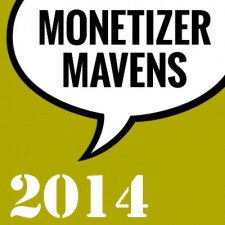We've been running our Mobile Mavens panel of experts for a number of years, and in 2014 we levelled up the concept by adding our Monetizer Mavens.
This being our final discussion of 2014, we gave our F2P experts the opportunity to review the year, asking them:
What was the most interesting trend in F2P game design in 2014?
What was your favourite F2P game of 2014?
And, what new trends do you expect in 2015?

The most interesting trend this year was the pure maturation of the market. If I look at the current top 25 grossing iPhone games in the US right now, only 8 were released in 2014.
All the top games released this year are from an entrenched player (Supercell, King) and/or leverage a brand (Family Guy, Kim Kardashian). This list is also dominated by familiar genres of color matching puzzle, city MMO and social casino games.
The increased importance of video ads as meaningful source of revenue has been a common theme.Ethan Levy
We are in a truly mature market. For those with chart topping ambitions the rich will get richer, the poor will get poorer, budgets will get bigger and competition fiercer.
When talking to smaller scale developers, the increased importance of video ads as meaningful source of revenue has been a common theme. Especially for those that do meaningfully integrating the ad into the game experience and properly incentivizing the player for watching.
As for 2015's trends, I expect brands will continue to dominate. Reading Polygon's excellent piece on the demise of THQ, I couldn't help but think that a version of that company would have been a big player in today's mobile market.
I hope we'll see a new genre or platform emerge in 2015 to shake things up on mobile.
Also, as discovery continues to be a top issue for game developers, I hope we see some innovative designs aimed at creating true social and viral gameplay.
The most interesting trend for me is the changing attitude towards energy and session length, typified by Hearthstone's missions: here is a daily mission that gives you high rewards. When that's finished, you can leave if you want to.
You want to keep playing, but the F2P rewards are much lower - which means you are choosing to stay because (gasp) a F2P game is fun.
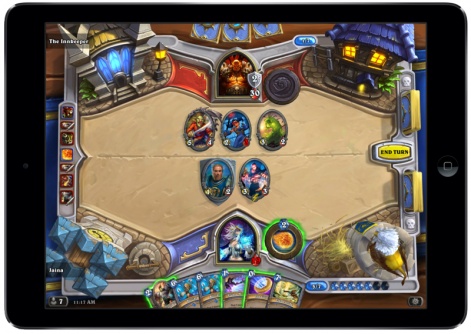
While I expect to see energy mechanics stay in place, and sessioning will still be critical, I expect many more games which let people play for longer.
My favourite games of 2014 were Disco Zoo (I love collecting make-work) and Kingdom Rush: Frontiers (not free, and released in 2013).
I feel a little depressed about next year. Like Ethan, I think the market has matured. If it is less about innovation and understanding now, and much more about execution. To me, that is the less exciting part of game development, and rewards those with lots of money, rather than those with creativity, insight, flair and passion.
More broadly:
- Traditional media is still not going to realise that Amazon got Twitch for a steal, and will create a network to rival ESPN over the next decade.
- Microsoft will think it overpaid for Minecraft.
- Advertising will become a key part of the revenue of F2P games. When the ad spiral collapses, which I believe it will, some companies will lose 50-100% of their revenue overnight. That will be messy. (But probably won't happen in 2015).
- That something unexpected will happen. For the first time in a decade, I can't see what is about to happen next. I find this disconcerting. I'm taking some time off to clear my head and start prognosticating again.
I hope you all get some time off too. Happy Christmas.

Personally I feel that the most interesting trend in 2014 was the launch of core games for tablets.
My favorite game of 2014 is hands down Hearthstone.
We'll see more amazing core games on tablets.Michail Katkoff
There are just so many reasons to love it: It's accessible yet immensely deep. The sessions are perfect in terms of engagement, length, variety and fun. It is a competitive yet not punishing. The game has created a community around it and it monetizes extremely well without being pay-to-win. And finally because it is a truly new game unlike 99.5% mobile games launched this year.
Because of the first batch of core games on mobile I'm super excited about the next year. With games like Vainglory creating the MOBA market and Hearthstone establishing a card battle market I believe that we'll see more amazing core games on tablets, simply because the core players are moving on to the platform.
I also believe that this trend will hurt the mid-core games the most by winning over players fatigued by building timers, short sessions and grinding for resources.
I wouldn't necessarily call it interesting but the most obvious trend for me was the perfection of proven mechanics.
We've seen so many small variations and little improvements that it actually reminded me of the min-maxing in MMORPGs where you try to squeeze the last 0.1% damage out of your character. You simulate whole combat scenarios and gather giant amounts of data to verify the most successful approach for your configuration.
The most notable trend for 2015 could be value for your money.Tim Rachor
And I got the feeling that we are overdue for the next big content patch where everything changes and we can start anew. I guess I'm not alone with this feeling as we are seeing more and more big players trying to find the next big thing. It could become a bumpy ride because the app stores are not overwhelmingly helpful with establishing new concepts for a broader audience. I'd say that pretty much sums up the question: "Where do we go from here?"
The most notable trend for 2015 could be value for your money.
Many designers argue that your F2P game will be more successful in the long run if you go for value instead of grind, wait or paywalls. And their voices are heard more often these days.
This seems logical as you want your players to pay again and again but the cash cows in the market still mostly work with obstacles you can remove for money. Even though I'm a little skeptical it would be a blessing for everybody if this trend works out and I hope the carrot wins over the stick.
It's not a mobile title (yet?) but my favorite F2P game of this year is Blizzard's Heroes of the Storm.
Even as I've played most MOBAs I've never really became comfortable with the genre. But Heroes of the Storm was the first really accessible MOBA for me and it features coop gameplay... so really my kind of game. The monetization seems to have worked in Hearthstone so they copied most of it to Heroes of the Storm which is fine by me.

Author of Freemium Economics, published by Elsevier in 2014: http://amzn.to/19zaPQB
Owner / Editor at Mobile Dev Memo: http://mobiledevmemo.com
My favorite mobile games of 2014 are:
- Vainglory. While the game has some fundamental problems, it is immaculately balanced and, when the stars align in terms of team matching (eg. teammates don't AFK and/or grief and can play the game competently, opponents aren't sitting in the same room, etc.), it provides a genuinely thrilling experience.
- Best Fiends. I think Seriously did an amazing job of adding depth to the match-3 mechanic, and they've also produced one of the most polished games I've seen in that genre.
- Goat Simulator. The mobile port is a blast to play and cracks me up consistently.

With over 15 years’ data mining experience, Mark co-founded deltaDNA, formerly GamesAnalytics, to unlock big data to drive player understanding, introducing the concept of Player Relationship Management to build better games.
I believe the biggest trends of 2014 were 'attack of the clones' and the rise of mainstream CCGs.
The amount of Flappy Bird clones populating the mobile marketplace was unbelievable at one point, I read somewhere that there were 60 Flappy Bird clones hitting the app store each day.
It did however set a trend of a more simplistic single input mechanic which was easy to pick up but hard to put down. Rovio's LVL11 even experimented with the recent trend and released an old-school 8-bit airplane flyer Retry, which is not only a nod to retro classics in sound and design, but almost certainly born out of the sudden success of Flappy Bird.
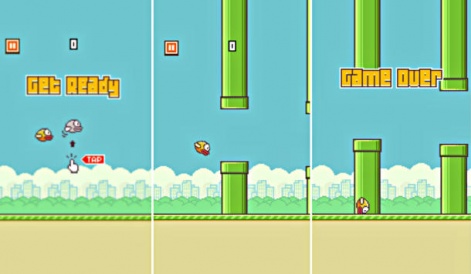
One of my favourite F2P games of the year has to be Hearthstone: Heroes of Warcraft.
Blizzard crafted an addictive, highly accessible title that's genre is traditionally aimed at a niche market and successfully dropped it into the mainstream. With thanks to a strong onboarding process, simple yet non-forceful monetisation model and addictive competition mechanics, the game was able to survive the unforgiving mobile market as well as on PC. The success of this title also weighed heavily on the careful balancing of bringing in new players to the franchise without alienating World of Warcraft's loyal followers and they nailed it.
I'm sure, much like World of Warcraft, we will still see this game being continually updated and making waves in years to come.
As for possible trends for 2015, we could see games like Hearthstone: Heroes of Warcraft and iOS MOBA Vainglory attracting more core gamers and bring competitive mobile gaming into the 'eSport' spotlight.
2015 will be about optimising, evolution rather than revolution. We have had three years of massive changes to the games industry, when we look back at this time it will be clear that the industry went through a huge upheaval. Three things have happened:
- The rise of mobile, where the device in your pocket is almost as powerful as the console under your TV.
- The rise of self publishing, no longer is the industry controlled by a small number of large publishers.
- The rise in the different ways consumers can pay for their games.
This all amounts to choice, suddenly consumers have huge choice, from the device they play on to the way they pay for it. They no longer have to wait in awe of the next big EA release and pay up front for the pleasure. This has been talked about for a very long time, but is now a reality, and like any utopia, the reality is never quite perfect.
This has opened up a number of challenges, which is where the next great innovations will happen:
- Lots of choice means huge problems in discovery,
- New business models means lots of opportunity to give customers poor experiences as they learn the new rules
- Funding game development, from crowd sourcing to publisher funding
So 2015 will be about making this new world work, finding new and innovative ways of letting people discover games and share them with their friends. Systems need to get better at recommending games to people based on their behaviour.
The F2P model needs to evolve, making games free is great but forcing players to grind is not fun. The industry needs to find ways of breaking up the payment structure so players can pay in small increments, but widen the number of payers so the industry is less focused on whales.
Interaction and engagement are not the same thing.Mark Robinson
A lot of this is about making the systems more intelligent (or at least less dumb). Adaptive systems where the games learn from how players are interacting with them and change the experience are key to making the experience more immersive.
Games will also become more niche, aimed at specific target audiences. The rise of the adventure game and the space sim are good examples of how the industry is finding genre that appeared lost in the mists of time.
In parallel we have been on a journey of discovery, we are now finally finding out what our customers think of the games that we create. The problem is that most of them don't really like them (even if we give them away for free).
Our games need to more inviting, less hardcore and better at entertaining. Interaction and engagement are not the same thing, making games an enjoyable experience from the moment you sit down is still something the industry is not good at. The death of the arcade in the early noughties killed the need for the instant 60 second appeal and we started to build games where it took hours to get in to the experience. With advanced analytics we have the ability to really get under the skin of our players. Combining this with adaptive game play and we can really start to build games that meet the players expectations.
So 2015 will be about engagement – if you get that right then you will create successful games.

Jordan Blackman is a lead designer and producer with over ten years of experience designing, producing, and managing hit content for companies like Zynga, Ubisoft, NovaLogic, & Disney.
Over 80 million people have played games that Jordan worked on as either a producer or designer.
Jordan’s credits include Lead Designer on FrontierVille & CastleVille, Senior Producer and Original Concept on CSI: Crime City (Facebook), Producer on Delta Force: Black Hawk Down, and Writer on Joint Operations: Typhoon Rising.
With a lack of new experiences breaking through in F2P, it's been polish, value, and licenses that have become the key differentiators.Jordan Blackman
F2P has been a breathless ride, but this year felt like the rollercoaster was slowed down a bit. It was a year where the top grossing games hardly changed. It seems like so many studios were chasing the leaders by developing versions of Clash of Clans or Game of War.
With a lack of new experiences breaking through in F2P, it's been polish, value, and licenses that have become the key differentiators. Adrian Crook & Associates' clients understand free-to-play better than ever, but precisely because of that they know that they need to go further and make sure they are providing best-in-class experiences.
Does all this mean the market is mature?
Maybe not. The success of games like Game of War and Kim Kardashian: Hollywood also demonstrate the importance of finding underserved demographics.
In any case, without new and compelling experiences mobile LTVs will inevitably decline. Perhaps F2P gaming is ready for its own 'indie' movement.
In a market like this, Blizzard is poised to kick ass and Hearthstone has been my most played F2P game this year by a wide margin. It's a fantastic game, and follows Blizzard's famous formula of making the niche mainstream.

I've also been impressed with Mind Candy's World of Warriors, a best-in-class game that paints mostly by the numbers with an incredible sense of gloss and style. It's a reference I've been coming back to regularly in our design work at AC+A.
2015 Trends:
- The Kardashian wannabe games are coming.
- We'll see more triple-A licensed mobile games behind the success of games like Family Guy and Injustice.
- We'll see F2P finding more success on consoles.
- Publishers will start to be in the drivers seat again as budgets and schedules expand to increase quality and aid in aquisition.

It's too late to be coming to the table with anything startlingly new, the year has been well described by all so far. The trend is, no doubt, discovering and settling on what works.
While there is unquestionably a huge raft of things that will work that we haven't tried, there now exists a good number of genres and techniques that we have tried that do work, and doubling down on those is the state of the market at the moment. Fewer risks, more refinement, and as a consequence, 2015 will probably be pretty dull.
We're in a slightly dull period at the moment.Mark Sorrell
There is definitely still the chance to do something different, as Hearthstone (which is, unsurprisingly, also my F2P game of the year) amply proves. But I'd expect the next year will be a year of entrenchment and fine-tuning, with the smaller studios left to do the interesting and high-risk, high-reward strategies and concepts.
I would hope to see F2P start coming to console in a serious way, but I think that's still a year or so away. Destiny is clearly designed with F2P tropes in mind, but it's a mixed success in those sort of terms, and I'd be surprised if we see anything huge hit much before the next generation of titles, so perhaps 2016.
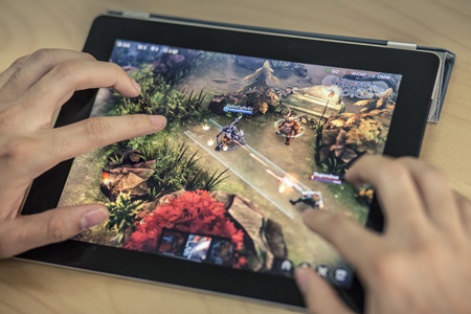
The movement in the other direction, with core games on tablet is much more likely to define 2015, with Vainglory showing that it can really be done (Hearthstone's work here is yet another reason why it deserves so many plaudits). It will take the market a while to adjust, but by this time next year, I expect we will have seen more 'serious' titles make it big on tablet.
So all in, we're in a slightly dull period at the moment, with big bets and small movements the order of the day. But that said, one should always expect the unexpected and I'm hoping that something I would never have predicted can swoop in and shake things up over the next 12 months.
To all a merry Christmas, and see you in 2015!
I agree that we've seen near perfection in compelling game loops and economy design for some genres in mobile. Publishers really getting it right are reaping big rewards. I think 2015 will see publishers adapting these principles to more genres but also bringing more advanced gameplay mechanics for more core audiences. I also agree we're going to see more branded content and certainly more celebrity lifestyle games.
I would like to see more generous economies and more linear vs exponential growth curves in freemium games, and I'm convinced that there's more money in the former than latter.
As an industry we've underestimated the effort required to get anyone to buy anything.Jon Walsh
I also think we're beginning to see a step up in terms of 'mass customization' or what we've dubbed 'player-centric monetization', which is the concept of selling someone something based on their behavior and condition in a game experience as they need it.
I'm a big fan of this trend and think we need to see a lot more of it. Consumers are being optimized in many other industries and I think have come to expect more personalized marketing efforts. I for one, almost expect anything I do online or digitally to be recorded, which I've accepted in exchange for using that information to give me what I want when I want it.
A lot of the time I don't want to think too much about what to buy, I want someone to tell me. That's why end caps at retail work so well and why Amazon gets me to add one more thing to my basket almost every time.
I know that many publishers are leaving money on the table by taking a more passive and anonymous approach to IAPs and even things like rewarded ads. The thing I probably say too much to game makers is if you want someone to buy something you have to ask them to buy it. Make sure they need it and sell it for a fair price and don't make them work to find it.
Putting dynamic in-app purchase opportunities in the flow of the game and making them contextual to the player circumstance makes a huge difference in terms of conversion and of course engagement and player enjoyment. I think as an industry we've underestimated the effort required to get anyone to buy anything and that taking a page out of retail in terms of end caps, better sales and merchandising and online shopping in terms of custom offers, bundles and 'people also bought' type initiatives will drive big improvements in publisher revenue.
I'd love to see many more games get to Hearthstone-type paying player conversion of 10% vs. the 2% we see on average today in mobile games. I honestly think it's doable with some of the things above and that our entire industry has huge growth ahead if we work to get these things right.

2014 has been a very interesting because it started out so shaky. Though it looked as, even early 2014, King and Supercell were unstoppable, the first half of the year showed some less fortunate games and tendencies. Not mentioned above is the tendencies to take PC games of some age and going F2P, e.g. Dungeon Keeper, Rollercoaster Tycoon 4.
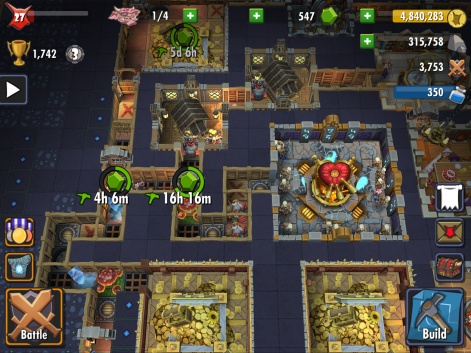
I think the industry, and especially the F2P market, learned an important lesson from these, excuse me, abomination between a F2P business model and gameplay aimed at, at least to a certain extent, an mid-core audience.
These games definitely set the tone for 2014, and I think a good portion of the releases later in 2014 was somewhat inspired by these games - inspired to avoid the mistakes these games made. 2014 showed us that neither 'core gamers' or 'casual players' will put up with 1-Click 24-Hour wait timers and half done game design in a 'fun' outfit.
Speaking of outfits, as previously mentioned, 2014 in mobile and F2P showed that the market is starving for games aimed at the younger female audience. Kim Kardashian: Hollywood really showed that you can utilize the mechanics, the gameplay and the economy that works in dragon-slaying, card-turning, gear-collecting 'boys games' - and make it a huge success. I'll bet we'll see the offspring of Glu's success in 2015.

As for expectations for 2015, I think we'll begin 2015 by realizing that MOBA doesn't work on mobile. There are simply too many input boundaries to make it work.
More generally, 2015 will be an amazing year in relation to monetization, and hopefully, though doubtfully, see a shift in the type of games at the very top. I personally admire King and Supercell's success, but I'm getting pretty tired of seeing the same 5 games at the very top, week after week.
Have a great 2015!

